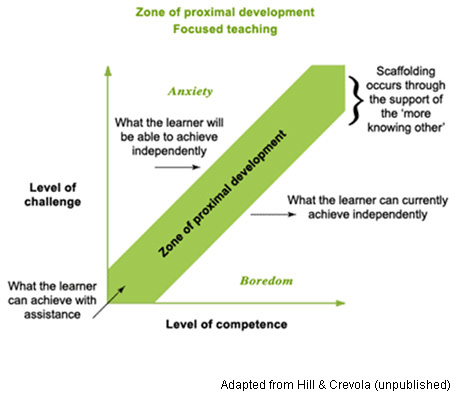
I think that Erikson's theory is very interesting and helpful. As a future elementary school music teacher, I focused on the information for that age group of children. According to Erikson's theory, the children I will teach will be in the fourth stage: achieving a sense of industry and avoiding feelings of inferiority. Industry is defined in our book as "eagerness to engage in productive work."
As a teacher, I will have to make my students eager to engage in their work, but also keep them from feeling inferior to their other classmates. This will be hard to do. If a student is eager to work, but discovers that their work is inferior to their classmates work, then the student will be discouraged and stop working. The book offers some suggestions as to how to avoid this. I liked the idea of tolerating honest mistakes. To incorporate this idea, I am not going to require my students to perform a piece of music perfectly before they can move on to the next piece. As long as they understand the basic concepts and are trying hard, it's ok to make a few mistakes. I will also try to encourage all my students, not just the discouraged ones, by complimenting them every day and pointing out all that they learned in each class period.
Last night, our lecture was about the library. I thought the lecture time could have been better spent. All of us took Paideia and were required to use the library website to find scholarly articles. The databases were updated this summer, but all that was changed was the look of the websites, not the actual way of finding articles. The presentation could have been summed up in five minutes and we could have spent the rest of the time discussing something important. Chapter Two of our text mentions teaching in the Zone of Proximal Development. Last night's lecture would have been in the Zone of Proximal Development for anyone age 50, not people age 19/20. We already knew the material she was teaching. (Refer to the picture above for more information about the Zone of Proximal Development.) I would suggest cutting this lecture from the syllabus for next semester's class.
As a teacher, I will have to make my students eager to engage in their work, but also keep them from feeling inferior to their other classmates. This will be hard to do. If a student is eager to work, but discovers that their work is inferior to their classmates work, then the student will be discouraged and stop working. The book offers some suggestions as to how to avoid this. I liked the idea of tolerating honest mistakes. To incorporate this idea, I am not going to require my students to perform a piece of music perfectly before they can move on to the next piece. As long as they understand the basic concepts and are trying hard, it's ok to make a few mistakes. I will also try to encourage all my students, not just the discouraged ones, by complimenting them every day and pointing out all that they learned in each class period.
Last night, our lecture was about the library. I thought the lecture time could have been better spent. All of us took Paideia and were required to use the library website to find scholarly articles. The databases were updated this summer, but all that was changed was the look of the websites, not the actual way of finding articles. The presentation could have been summed up in five minutes and we could have spent the rest of the time discussing something important. Chapter Two of our text mentions teaching in the Zone of Proximal Development. Last night's lecture would have been in the Zone of Proximal Development for anyone age 50, not people age 19/20. We already knew the material she was teaching. (Refer to the picture above for more information about the Zone of Proximal Development.) I would suggest cutting this lecture from the syllabus for next semester's class.


No comments:
Post a Comment